Feeling Kinda Funny With Ear Full Feeling
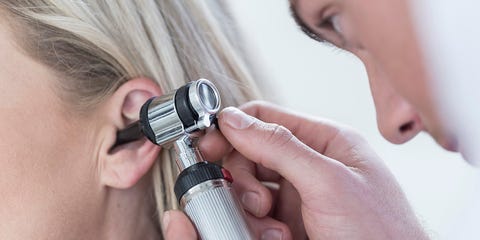
Westend61/Getty Images
Constant ringing, pain, dizziness, difficulty hearing, fluid drainage, trouble balancing—for such a small part of the body, ears can certainly cause a lot of trouble. From slow changes to sudden symptoms, it's important to pay attention when your ears act up—catching hearing loss or painful infections early is vital to preserving hearing and health.
Typical hearing loss isn't the only thing to keep an ear out for—changes in hearing can point to larger problems in the body like undiagnosed diabetes or hidden tumors. And people who have difficulty hearing are more likely to develop dementia and Alzheimer's. (Discover the 5 best foods for your brain and how to slash your risk for dementia in Prevention's Ageless Brain.)
Here are 14 factors that can lead to weird ear symptoms.

Image Source/Getty Images
1 of 14
Age
Everyone knows that your hearing gets worse with age, but it may still take you by surprise when it happens to you. One in three adults between the ages of 65 and 74 have hearing loss in the U.S., and almost half of people older than 75 have trouble hearing. Lifestyle plays a large role in when, if at all, you start having trouble hearing. Frequent exposure to loud noises, smoking, and whether or not it runs in your family heavily influences age-related hearing loss. Typically age-related hearing loss starts slowly and gradually progresses equally in both ears.

PeopleImages/Getty Images
2 of 14

Peter Muller/Getty Images
3 of 14
Cumulative hearing damage
One raucous concert won't leave you permanently deaf, but the more you expose yourself to loud noises, the worse the damage is and the more likely you are to experience trouble hearing at an earlier age. Turn up the volume at the gym to tune out the annoying music they play, mow the lawn without ear protection, roll the windows down in the car and turn up the music—it all adds up.
"It's much more common now to see older teenagers and younger adults with hearing loss," says Grimes. "It is presumed that this is a result of increased noise exposure." If you can't have a conversation with the person next to you at a normal volume or if they can hear what you are listening to, your music is too loud. Same goes for anything else you are doing. Either turn it down or wear ear protection to prevent damage to your hearing.
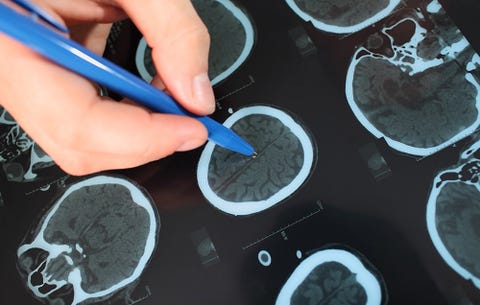
sudok1/Getty Images
4 of 14
Tumor
While not as common, tumors along the nerve that connects the ear to the brain or in the inner ear can cause a noticeable decline in hearing. Typically these tumors are found in people who have hearing loss in one ear, but not the other. Dizziness and vertigo are also signs that a tumor may be present. It's important to get a comprehensive evaluation from a specialist as soon as symptoms start to determine if a tumor is causing hearing loss and treat the issue.

Hero Images/Getty Images
5 of 14
Excessive pressure in the eardrum
While experiencing popping or increased pressure in your eardrums while flying or swimming under water is completely normal, painful pressure or popping without a change in air pressure is not. A swollen throat or ear can close your Eustachian tube, which connects your middle ear to your upper throat, and prevent your eardrums from equalizing to the pressure of the air around you.
MORE: 10 Reasons Your Hands Are Going Numb

JoKMedia/Getty Images
6 of 14
Trauma
Head trauma can cause rapid, potentially irreversible hearing damage. "A blow to the ear, if it's just right, can rupture the eardrum. Head trauma can disrupt the bones in the middle ear, " says Grimes. If the blow is severe enough, it can cause hearing to be permanently lost by draining the fluid in the inner ear.
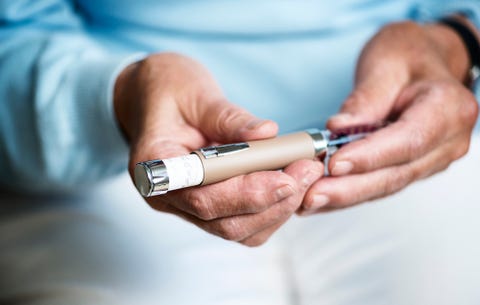
ClarkandCompany/Getty Images
7 of 14
Diabetes
It's no coincidence that hearing loss and diabetes are two of America's most common health concerns—nearly 30 million people have diabetes in the U.S., and 34.5 million people have some degree of hearing loss. People with diabetes are twice as likely to develop hearing loss than people who do not have diabetes according to the American Diabetes Association. While the exact reason is unknown, researchers believe that diabetes may damage the nerves and blood vessels in the inner ear. People with diabetes can protect their hearing by carefully monitoring and managing their glucose levels, according to Erika Woodson, MD, the medical director of Cleveland Clinic's Hearing Implant Program.
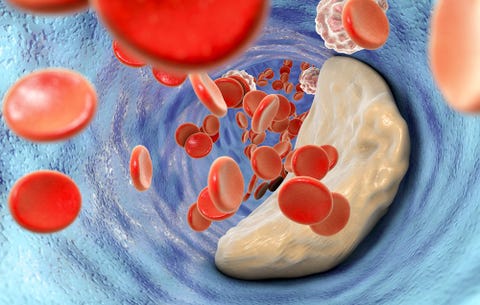
KATERYNA KON/SCIENCE PHOTO LIBRARY/Getty Images
8 of 14
Heart disease and high cholesterol
Heart disease, peripheral vascular disease, high blood pressure, and high cholesterol may also damage the ear and harm hearing because they prevent proper blood flow.

Innocenti/Getty Images
9 of 14
Medications
There are more than 200 medications that are known to damage hearing on the market today. Before you start throwing out your entire medicine cabinet, know that most of these drugs are only used to treat severe, life-threatening conditions like cancer and aggressive infection. However, many medications may cause dizziness, and high doses of aspirin and nonsteroidal anti-inflammatory drugs like ibuprofen and naproxen can also cause ringing in your ears (tinnitus) and hearing loss.
MORE: 4 Common Medications That Are Making You Tired
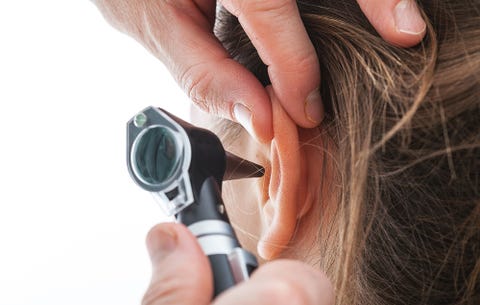
KatarzynaBialasiewicz/Getty Images
10 of 14
Infection
Ear infections can cause temporary trouble hearing, pain, swelling, and fluids to drain from the ear. If frequent enough, especially for children, ear infections can permanently damage hearing.

Yurchello108/Getty Images
11 of 14
Earwax buildup
The friendliest ear problem on the list, earwax buildup is highly treatable and preventable. "Everybody makes wax, and some people make more than others. But for 99% of us, it's not a problem," says Woodson. Earwax buildup can cause hearing to be muffled, distorted, or block hearing entirely. Attempting to clean your ear at home with things like q-tips can make the problem worse and impact the wax around your eardrum, making it more difficult to hear. Ears are self-cleaning. If you do have earwax buildup or a blockage, a quick visit to your doctor can clean it out and restore your hearing.
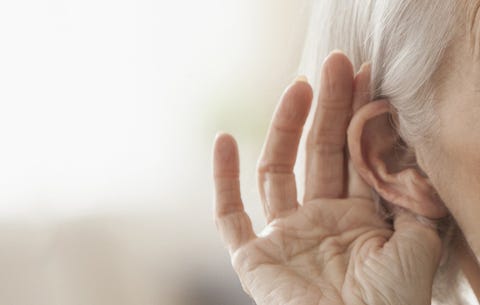
Jose Luis Pelaez Inc/Getty Images
12 of 14
Sudden hearing loss
Sudden deafness, or sudden sensorineural hearing loss, comes on without warning or an obvious cause. "A person can go to bed at night with two normal hearing ears and wake up in the morning and one ear is completely deaf," says Grimes. If treated quickly, oral steroids may bring back some or all of the hearing. However, if left untreated the hearing loss becomes permanent after 2-4 weeks.
MORE: 5 Signs Your Back Pain Might Signal A More Serious Problem

designer491/GettyImages
13 of 14
Otosclerosis
Your bones are constantly remodeling themselves, including the bones in your middle ear. But when that remodeling goes awry, the bones in your ear become overly stiff and no longer conduct sound properly. More than three million people the U.S. have otosclerosis, a hardening of the bones of the middle ear, and it is most common in middle-aged women. It typically starts in one ear and moves to the other. Some people also experience ringing, roaring, buzzing, or hissing in the affected ear.

Thinkstock/Getty Images
14 of 14
Hyperacusis, or noise sensitivity
A tapping pencil or the whine of a refrigerator may drive you up the wall, but you may have hyperacusis if the noise from a running faucet, walking on leaves, or shuffling papers are painfully loud. While many people can be sensitive to sound, hyperacusis is rare—approximately one in 50,000 people will develop it. It's unclear what causes the condition, but people with hyperacusis do not process noise in the brain normally.
Source: https://www.prevention.com/health/g20440867/14-reasons-your-ears-are-acting-weird/
0 Response to "Feeling Kinda Funny With Ear Full Feeling"
Post a Comment